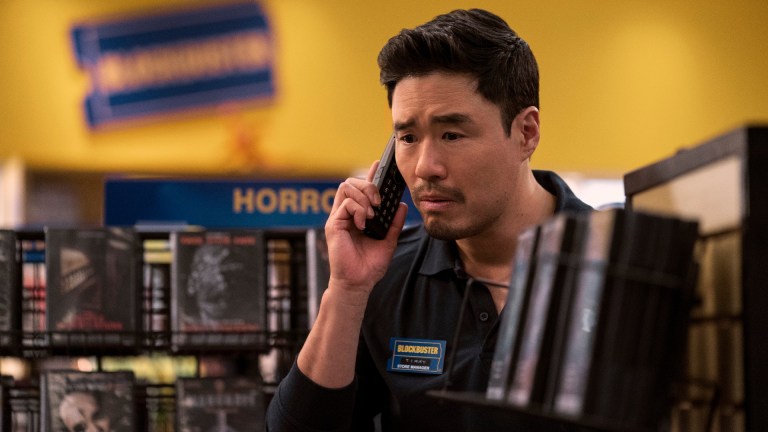Netflix’s Blockbuster Should Have Been A Period Piece
Netflix dances on the graves of its enemies in cheery workplace comedy Blockbuster. But it has one fundamental problem.

In its heyday, Blockbuster Video boasted over four thousand locations in the United States alone. That’s a lot of return slots.
As the Blockbuster conglomerate grew, millions of people headed out to get their video fix by driving to the closest blazing bright blue and yellow sign to browse in person. If you were a film aficionado from the late 80’s to the early 2000’s, Blockbuster was (probably) your jam. (Hi. Hello. It’s me.)
Blockbuster, a new Netflix series that takes its name directly from the once-popular chain, knows all of this, and it sincerely hopes to appeal to your nostalgia sweet spot. In fact, multiple characters comment on the nostalgia factor throughout the first season, with one person even saying, “never underestimate nostalgia” at one point in time. However, by setting the narrative in a bleak version of the present instead of the storied past, the series misses out on many chances to really make the magic of nostalgia work for it.
Before the opening credits even fade on the first episode, Blockbuster firmly establishes that the video store is a dinosaur on the very brink of extinction. And as much as the characters gamely try to convince us that they have an abiding love for their jobs and that they’re going to do everything they can to save their beloved store, there’s an immediate melancholy that settles over the rest of the narrative.
As the first season progresses, owner Timmy (a game Randall Park) frantically tries to keep his business afloat by attracting new customers in various ways. He’s been working at the store since he was a teen, and he’s not ready to say goodbye. His tactics aren’t exactly ingenious — one early idea is a “block” party to help drum up more business — and there’s a desperation to his effort. Timmy is a fan of nostalgia, too, and the unspoken truth of his situation is that if he loses the store, he also severs any meaningful tether to his youth. Yikes.
The remainder of the staff also seems to be attached to the store as they often speak in movie trivia and famous quotations, which is very cute and fun. Eliza (Melissa Fumero) is stuck in an unhappy marriage but she really enjoys spending time with her friends at work. Like Timmy, Connie (Olga Merediz) has also worked at the store for decades and provides some movie-humor levity as she still doesn’t quite have a handle on all the most popular titles and actors. Carlos (Tyler Alvarez) is a sweet film buff with big dreams of becoming the next Tarantino, and Hannah (Madeline Arthur) is a twenty-something with a manic quirky energy and a penchant for all the most wholesome content. Kayla (Kamaia Fairburn) is a disaffected youth who works at the store ironically, and her father Percy (J.B. Smoove) happens to be both the landlord for the business as well as Timmy’s bestie from high school.
All of the characters are compelling and mostly have a playful chemistry, but setting the series at a dying business strips the show of many things that make workplace comedies great. As the store operates on a shoestring staff of only six employees (that comprise the main cast), the show loses out on the opportunity to branch out into fun B-stories about ancillary and background characters that work at the store as well. The customer base is sorely lacking as well, and every time a rando customer asks a question about a specific choice, it feels very odd that they’re not just whipping out their phones to Google the answer.
Given that not much is going on inside the store at any point in time, the story often has to travel to alternate locations for vast periods of time to follow interesting storylines. Many great workplace comedies tend to stay put, at least for the first season. Examples? I’ve got ‘em. The Dunder Mifflin crew on The Office didn’t venture out until the second season, Sam Malone and the gang rarely left Cheers, and all the action on the current sitcom smash Abbott Elementary mainly stays within the crumbling walls of the titular school. Blockbuster creator Vanessa Ramos is a veteran of top-tier workplace comedies such as Brooklyn Nine-Nine and Superstore, and it often feels like she knows that the action should take place within the iconic, DVD-lined walls of the store, but she struggles to find compelling reasons to keep the characters there.
All of this left me thinking: What if Blockbuster had been set in the mid-to-late 90’s? It sure feels like many of these issues wouldn’t have been issues. A packed store means more employees, more customers, and more drama, baby! Blockbuster used to be a legitimate place to wander with friends, run into people you knew, and sometimes even get your flirt on. Forget Netflix and chill, remember Blockbuster and bang? (Ok, this wasn’t actually an official thing, but I’m sure it happened.)
Also, can you imagine the soundtrack?! Some of the greatest hits of the 90’s came directly from popular films. As we all saw this summer, Netflix darling Stranger Things consistently uses nostalgic music to great effect, and I would definitely have been running up any hill to watch an episode or two of Blockbuster that featured famous musical movie moments.
Speaking of Netflix, it is very odd that this show has landed on the very platform that led to Blockbuster’s near-extinction. It feels possible that the streamer wanted to set the series in the present to illustrate that they have the upper hand on providing content to the world writ large, but the beep-boop algorithms must also know that nostalgia is king right now. Engaging in nostalgia is great and all, but not if viewers are constantly being reminded that the thing that they once loved has essentially died. When I visit Blockbuster, I’d love to step into the bustling past when entertainment was something we sought out with purpose and intention, not something we passively consume just because we can.
All 10 episodes of Blockbuster are available to stream now.
